of the international academic conference
Demographic Fears, Conspiracy Theories,
and Race Wars.
of the EnGendering Europe’s ‘Muslim Question’ research
project funded by the Netherlands Scientific Council (NWO).
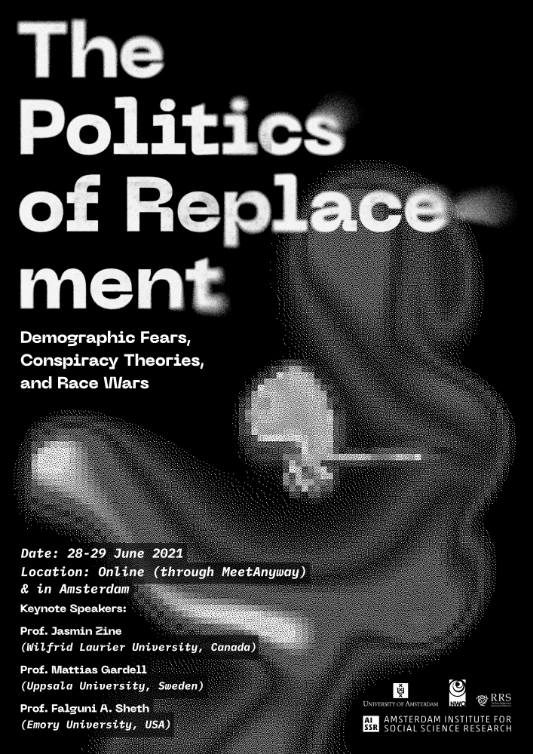
First scheduled to take place in June 2020, the global pandemic forced us to postpone the conference. While for a long time we remained committed to organizing a real life gathering in Amsterdam, at some point we decided that an international gathering of scholars who have dedicated time and energy to critically study the rise and the constitution of replacement conspiracies cannot wait.
This means that the conference will, to a large extent, be an online conference, and speakers and participants will meet each other through the online platform MeetAnyway. With a hybrid touch: some of the keynote speeches and panels will physically take place in Amsterdam and will be livestreamed.
In the following weeks, we will add the full programme and other conference logistics on this site. Keep an eye on this space for updates. We are looking forward to meeting you in June!
The Politics of Replacement
Demographic Fears, Conspiracy Theories, and Race Wars
Discourses and conspiracies about national populations under threat of being overtaken or even wiped out by those considered as ‘alien’ to the nation body are on the rise, yet again. From Eurabia fantasies to Camus’ The Great Replacement, from ‘Jews will not replace us’ (Unite the Right rally in Charlottesville) to ‘It’s the birthrates’ (in the Christchurch killer’s manifesto), white supremacist discourses are thriving and increasingly distributed in mainstream venues. These discourses rely on defining ontological distinctions between who belongs to the nation and who is ‘alien’, and visions about the reproduction of that nation, notably about who should procreate more and whose procreation is alarming and should be halted.
Narratives of ‘waves’ or ‘floods’ of migration as well as on high birth and fertility rates among ‘migrant’ populations have proliferated all over Europe in the past decades, and provided fertile ground for the ‘fear of replacement’. Particularly after the 9/11 attacks and the ensuing ‘War on Terror’ a discourse problematizing the presence and existence of Muslims in the ‘West’ has burgeoned all over Europe, often taken the shape of the fear of ‘Islamization’, i.e., the substitution of European values, norms, and culture by Islamic ones. While this problematization is a multifaceted phenomenon that engages with notions and constructions of citizenship, racial characterizations, migrations, anxieties hovering around gender and sexuality, and ideas mobilized in regard to ‘Islamic’ violence, it is also centered in a discourse with variegated labels and signatures (Demographic Jihad, Muslim fecundism, the secret plot of Eurabia, the Great Replacement) that postulates a deliberative and conspiratorial process whereby Muslims have begun to ‘replace’ the ‘native’ populations of Europe. Concerns about ‘Muslim demographics’ within Europe, moreover, have been entertained, mobilized, and deployed to not only construct Muslims as problems and dangers to the present and future of Europe, but also as calls to revive eugenic policies aimed to gain control and determine the social, cultural, and ‘racial’ make up of European societies.
While we began investigating fears of ‘replacement’ in relation to Europe’s ‘Muslim Question’ today, we recognize replacement discourse as multiple and versatile, and unfolding in different contexts, and having different historical genealogies. This conference seeks to trace how ideas of (population) ‘replacement’ are developed with respect to different racisms (Islamophobia, anti-Semitism, anti-Black racism, racism against migrants and refugees, etc.); different demographic dimensions (with respect to migration, or birthrates and mortality, or cultural change and assimilation); different geographical locations (Europe; Middle East; North America; South East Asia, etc.); different time periods (medieval archives, colonial archives, Nazi archives, post-colonial migrations, post-11/9); and within different genres (scholarly knowledge production, statistics and demographics, literature, memes and social media, manifestos, journalism, etc.)
We invite submissions that interrogate the different ways in which the discourse of replacement has been formulated and mobilized.
Contributions might explore some of the following issues, but are not limited to them:
- National cases examining discourses on replacement. How has the fear of replacement been entertained and mobilized in a particular national context, what national archives and anxieties does it draws on? What role do public intellectuals and authors play in producing and disseminating ideas about replacement?
- Histories and genealogies of ideas of replacement. Concerns with population replacement and weaponization of birthrates and migration have a long history, for instance, including medieval Christian concerns about conversos and moriscos, or immediately after the period of Black reconstruction in the US and the emerging notion of ‘White genocide’. We invite submissions exploring the convoluted genealogies of ‘population replacement fears’ from a historical perspective.
- The relation between eugenicist ideas, biopower, and theories on replacement. The fear of replacement and its construction of Muslims as plotting to overturn Europe via population replacement more often than not conjures up ‘solutions’ which entail policies and regulations directed at taking control of the make-up of present and future demographic developments, which sometimes includes eugenicist arguments.
- The relation between conspiracy theories and race. Many of the ‘proofs’ that a population replacement is currently transpiring in Europe are fabricated documents, quotations, and statistical knowledge, which supposedly reveal that the population replacement is not a ‘natural’ outcome of demographic development but rather a combative strategy of Muslims in complicity with some European elites. Submissions exploring the conceptual and historical relation between the elaboration of conspiracy theories and forms of racial characterizations are welcomed.
- The convoluted relations between race, gender, and sexuality within the frame of population replacement discourses. The discourse on replacement mobilizes a wide range of racially constructed ideas such as Muslim hypersexuality, or the innate violent desire to overtake Europe. Within this context, the population replacement discourse engages as well with European rates of natality and thus with natalist European polices
- Theoretical and methodological approaches pertaining to the study of population replacement theories. We welcome submissions exploring conceptual tools, theoretical approaches and methods to investigate the formation of the replacement discourse and its recruiting of demographics, statistics, racism, gender, and sexuality.
- Far Right, social media, and replacement. The population replacement thesis has found in the internet a ‘fertile’ ground to expand and disseminate via blogs, cartoons and memes, while being the site of further re-elaborations. We invite submissions that are focused on exploring the digital culture of replacement.

Jasmin Zine
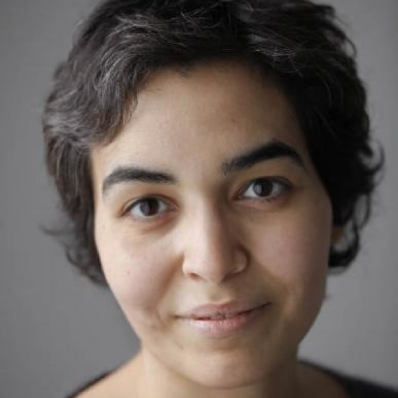
Nadia Fadil
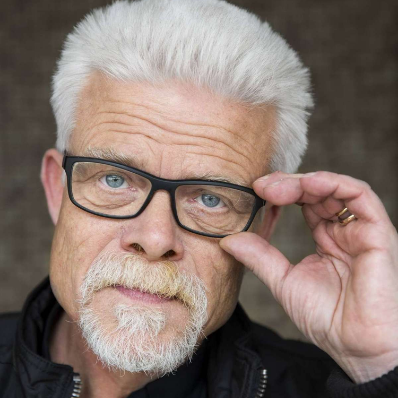
Mattias Gardell

Anya Topolski

Falguni A. Sheth
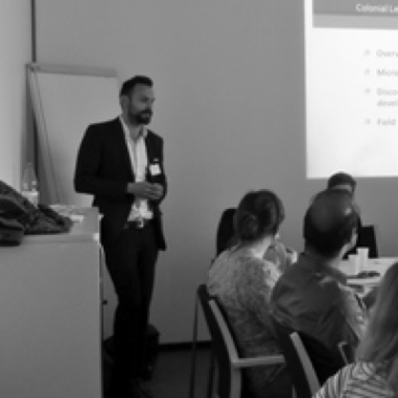
Luis Manuel Hernández Aguilar
to download the programmedownload the programme
In order to participate in this conference, either as regular participant, panelist, respondent or keynote speaker, you must be registered. Registration will give you access to the MeetAnyway online event space, where you will find more detailed conference information. Please note that this is an online conference for all participants. Some of the panels and keynote speeches will take place on the campus of the University of Amsterdam, and will be life streamed in the online event space. Due to Covid-19, it is not possible for regular participants to come to the campus of the University of Amsterdam.
register here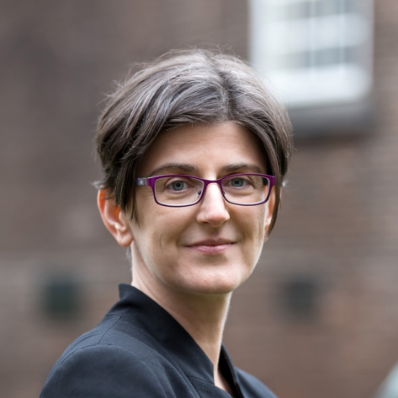
Sarah Bracke

Luis Manuel Hernández Aguilar

Melanie Haije

Pilar dʼAlò
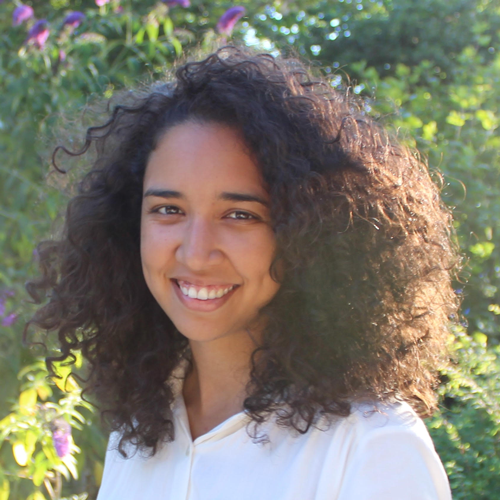
Sherilyn Deen

Roxane Kroon

Lou Mousset

Aslıhan Öztürk
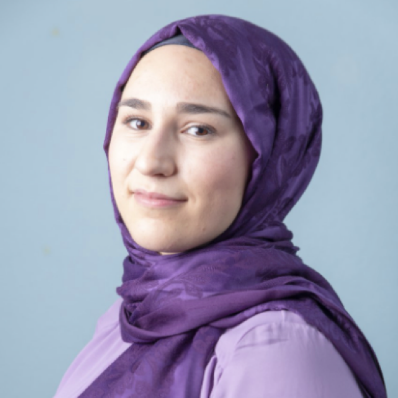
Berna Toprak


for Scientific Research NWO

